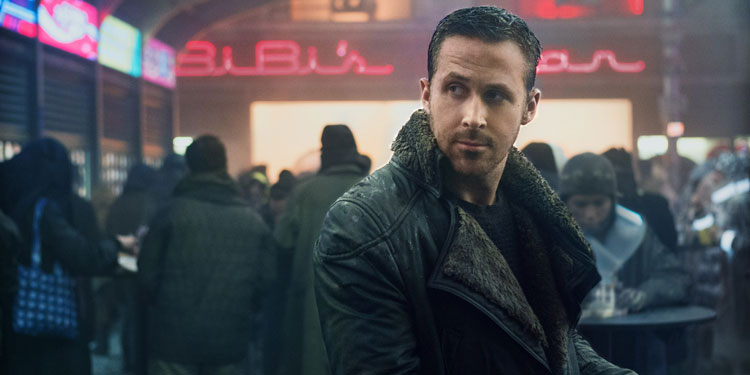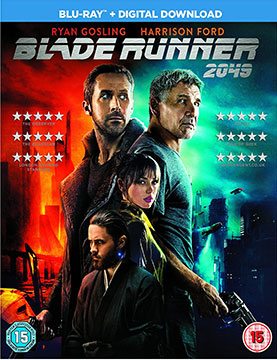
Director: Denis Villeneuve
Running Time: 164 mins
Certificate: 15
Release Date: February 5th 2018 (UK)

When it was first announced that a sequel to Blade Runner was in the works, it seemed like a bad idea. Ridley Scott and Harrison Ford are on a bit of a roll revisiting their greatest hits, following Scott’s Alien Prequels and Ford’s return to Indiana Jones and Star Wars. However, Blade Runner was such a singular movie – and one so far removed from the modern blockbuster – that it seemed a wholly bizarre idea to now be making a sequel.
Scott then handed the directing reigns across to Denis Villeneuve, which gave some guarded optimism following Sicario and Arrival, but it still seemed ill judged.
On its cinema release though, Blade Runner 2049 got a strong reception from surprised critics. Like the first movie though, it struggled a little more with general audiences, grossing less than $100 million in the US. It’s perhaps not too surprising, as while the original is beloved by sci-fi nuts and cinephiles, it’s not as revered by the general public. In fact, spending $150 million on a cerebral follow-up to the 1982 movie was always a bold move, but it’s certainly one which has paid off artistically – resulting in multiple Oscar and BAFTA nominations.
The action has moved on 30 years from the 2019 setting of Blade Runner. In the interim, mankind was almost destroyed by a ‘blackout’ that wiped all digital records. However, a man called Neander Wallace (Jared Leto) found a way to stop humanity starving, and also created a new generation of artificially created humans, known as Replicants. One of those Replicants is Agent K (Ryan Gosling), a Blade Runner, whose job it is to hunt down and ‘retire’ (aka kill) older Nexus 8 models, who are seen as less controllable and more dangerous.
K’s discovery of a box full of human bones following one ‘retirement’ suggests the impossible – that at some point a replicant had a baby. He starts to investigate what really happened, which leads him to a man who used to be a Blade Runner many years ago, Rick Deckard (Harrison Ford).
I think many assumed that any follow-up to a movie so renowned for its visual world-building, would result in a film that slavishly aped that look, while failing to capture the enigmatic, existential, dream-like, neo-noir vision of the original. Instead Villeneuve has created something that’s the other way around, where the story and the way it’s told feel like a continuation of Blade Runner, but the visuals are distinct. In the Special Features the director describes it as being the same palette but a different painter, which is a good description. It’s recognisably the same universe, but allows the movie to be its own thing, ensuring it doesn’t feel like it’s constantly demanding comparisons to its predecessor.
While not getting too pretentious about it, it’s a movie that’s interested in the existential condition of the replicants. While it would have been easy for the film to attack the philosophical underpinnings of the Blade Runner universe like a bull in a china shop, it pulls more power and potential from it by allowing the subtle undertones to percolate. The film presents a world where replicants are essentially indistinguishable from humans, but are treated badly, resulting in both prejudice against them and acceptance of their own subservient status. The film creates an intriguing dynamic that echoes everything from racism to homophobia, without being a direct parallel for either.
Like the first movie it is stalwartly enigmatic, asking the audience to question what they’re seeing, just as the characters must question their own beliefs about who they are and what they are. Sometimes things don’t 100% seem to make sense, but it fits with the dream-like nature of memory that it suggests. Likewise, K’s relationship with his holographic girlfriend, Joi (Ana de Armas), is presented as totally real, but then subtly reminds you that she may just be algorithms programmed to be everything K wants. It allows the movie to have a Russians Dolls unpacking of ideas about sentience and humanity – leaving open questions about how you decide and whether these things have any real meaning. Nicely it does all this without constantly patting itself on the back and signposting its philosophical credentials, it just lets them percolate under the surface.
Of course, it’s not all existential ponderings, with the movie presenting a good mix of drama, tension and some impressive action sequences. It may be a little bum-numbing at two hours and 40 minutes, but it’s never boring.
Gosling gives a great performance as K, showing a real delicacy in how he handles a complex and rather fascinating character. Ford may not be quite as iconic as he was in the original, but it’s nice to have him back as Deckard. That said, he’s perhaps the most underwhelming of the characters from the first film who return – including a surprise cameo that involves some brilliant special effects.
The HD Blu-ray picture looks great, showing off what a beautifully constructed world this is, with bold, memorable imagery that has great depth. There’s also some decent special features, including a trio of prologue short film that help fill us in on what happened between 2019 and 2049. Some will also appreciate ‘Blade Runner 101’ where the cast and crew help explain things and fill in some of the concepts that might go over some viewers’ heads. A 2-disc Blu-ray edition is also available which includes even more featurettes.
Overall Verdict: A great follow-up to an iconic movie, which takes the ideas of the original in interesting new direction, which consider the nature of prejudice and existence.
Reviewer: Tim Isaac
2-Disc Blu-ray Only: ‘To Be Human’ Featurette, ‘Fights of the Future: The Action of Blade Runner 2049’ Featurette, ‘Two Become One’ Featurette, ‘Dressing the Skin: The Fashion of Blade Runner 2049’ Featurette, Five Exclusive Art Cards Designed by Matt Ferguson
Leave a Reply (if comment does not appear immediately, it may have been held for moderation)